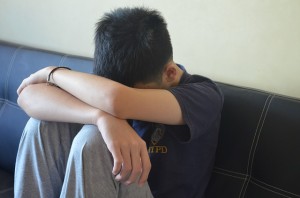Contributor: North Tampa Behavioral Health clinical team member Erica Smith, M.A., NCC
 Prescription drug abuse is an ever-growing problem amongst the American population. According to the National Institute on Drug Abuse, 52 million people in the United States have used prescription drugs for non-medical purposes at some point in their lifetime.
Prescription drug abuse is an ever-growing problem amongst the American population. According to the National Institute on Drug Abuse, 52 million people in the United States have used prescription drugs for non-medical purposes at some point in their lifetime.
Additionally, while the U.S. only makes up 5% of the world’s population, they consume 75% of the world’s prescription drugs (1).
Stay-At-Home Moms Often Fall Victim to Prescription Drug Abuse
Many people would assume that the individuals who abuse prescription drugs are teenagers and college students. However, there is an astounding number of stay-at-home mothers who have also found themselves addicted to these substances. Most of these addictions start out innocently enough, but quickly escalate into a severe problem.
One instance in which women may unknowingly begin on the path of prescription drug abuse is when they are prescribed medications in an attempt to help manage existing depression and/or anxiety.
According to parenting.com, parents, in general, are a population most vulnerable to suffering from prolonged depression and anxiety. In fact, studies have shown that parents experience depression at rates that are twice that of the general population (2).
Therefore, it is not unreasonable for moms to go see their general physician in order to discuss the concerns that they have. These doctors then have the power to prescribe things such as antidepressants and antianxiety medications.
Controlled Substances Risk Addiction
Many anti-anxiety medications, such as Valium, Klonopin, and Xanax, however, are considered to be controlled substances due to the fact that they have a high risk for abuse and addiction. So, while the initial prescribing of these medications is done so in order to alleviate a legitimate mental health problem, the pleasurable effects of these antianxiety medications can quickly elicit cravings.
For these mothers, they have likely found that, within the cloud that anti-anxiety medications can produce, they feel as though they are better moms. They may find that they are able to tolerate more; that their patience levels have increased as a direct result of the medication they are taking allowing their anxiety to subside.
The mindset of suddenly feeling as though one is a “better parent” can, understandably, bring about a desire to want to feel that way all the time, leading some to begin abusing these substances.
Stimulant Medications Are Common Among Mothers
 Another aspect of prescription drug abuse in stay-at-home moms comes in the form of stimulant medications. With the astonishing number of children who are diagnosed with attention-deficit/hyperactivity disorder (ADHD), there is an influx of medications such as Adderall and Ritalin being prescribed to help these children manage the symptoms of their illness.
Another aspect of prescription drug abuse in stay-at-home moms comes in the form of stimulant medications. With the astonishing number of children who are diagnosed with attention-deficit/hyperactivity disorder (ADHD), there is an influx of medications such as Adderall and Ritalin being prescribed to help these children manage the symptoms of their illness.
Stimulant medications such as these provide those who use them without having a mental health condition with an enviable rush of energy. The daily demands that are placed on stay-at-home moms can be exhausting, and suddenly having access to a medication that is widely-known to provide energy and rid one of overwhelming feelings of exhaustion can seem extremely appealing.
The Desire to Focus in an Over-scheduled Life
Some mothers have admitted to taking one or two of their child’s ADHD medication with the intention of only doing it once in an attempt to have the energy necessary to take care of a long list of responsibilities without becoming fatigued.
While they may convince themselves that doing so is harmless, it can quickly escalate into a problem when they realize that, after taking the medication, they were able to get so much done and still have extra energy to give their kids the attention they want to give them that it might not be so bad if they continued to take some of the pills every now and then.
Just Once Can Spiral Downward
But “taking some every now and then” can quickly turn into taking some every other day, to taking some every day, to suddenly feeling as though they cannot function without the help of these drugs. Additionally, these types of stimulants are also commonly known to induce weight loss by reducing a person’s appetite, adding to the allure of experimenting with these drugs.
Pain Medication
 Prescription pain medication is yet another highly abused substance. Again, the initial use of such medications can be completely harmless.
Prescription pain medication is yet another highly abused substance. Again, the initial use of such medications can be completely harmless.
Women may have gone to their doctor due to the existence of chronic pain, received a prescription for a medication like Vicodin or OxyContin, and rapidly find themselves addicted to the euphoric feelings that these drugs are known to elicit.
So how do you know if you or a loved one has developed a problem with abusing prescription medication? Here are just a few of the many warning signs to look out for:
- Sudden increase in energy/hyperactivity
- Changes in eating patterns
- Sudden weight loss
- Changes in sleeping patterns
- Drastic shifts in mood
- Changes in personality and/or temperament
Speak with a Mental Health Professional About Prescription Drug Abuse
If you have questions regarding other symptoms that you have noticed, it would be beneficial to speak with a mental health professional in order to determine if a substance abuse problem has developed. If it is determined that a problem does, in fact, exist, there are many treatment options available.
Inpatient treatment, partial hospitalization, intensive outpatient, and traditional outpatient treatment are all viable choices for receiving the help that individuals struggling with chemical dependency concerns need.
References:
- http://www.drugabuse.gov/related-topics/trends-statistics/infographics/popping-pills-prescription-drug-abuse-in-america
- http://www.parenting.com/article/xanax
About the Author:
“Prescription Drug Abuse by Stay-at-Home Moms” was written by North Tampa Behavioral Health clinical team member Erica Smith, M.A., NCC. Erica has several years of experience working in the treatment field as a clinical therapist and has her Master’s degree in Clinical Counseling from the American School of Professional Psychology.
Site Description:
North Tampa Behavioral Health is a state-of-the-art treatment program for men and women who are struggling with behavioral health concerns and chemical dependency issues. By implementing individualized treatment plans in both an inpatient and outpatient setting in a non-institutional environment, the caring and compassionate staff at North Tampa is dedicated to meeting each and every need of the patients who entrust us with their care. At North Tampa, we strive to make everyone feel welcome and comfortable as they take the first step on the road to recovery.
The opinions and views of our guest contributors are shared to provide a broad perspective of addictions. These are not necessarily the views of Addiction Hope, but an effort to offer a discussion of various issues by different concerned individuals.
We at Addiction Hope understand that addictions result from multiple physical, emotional, environmental, and genetic factors. If you or a loved one are suffering from an addiction, please know that there is hope for you, and seek immediate professional help.
Published on October 16, 2014
Reviewed and Updated by Jacquelyn Ekern, MS, LPC on January 6, 2021
Published on AddictionHope.com
